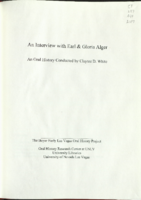Search the Special Collections and Archives Portal
Search Results

Lucela M. Wattin oral history interview: transcript
Date
Archival Collection
Description
Oral history interview with Lucela M. Wattin conducted by Stefani Evans on December 6, 2021 for Reflections: The Las Vegas Asian American and Pacific Islander Oral History Project. Lucela shares memories of her life growing up in Cebu Province, Philippines and being raised by her mother and grandparents after her father's death. She talks about immigrating to the United States under her fiancée's visa, moving to Chinatown in Las Vegas, and her work as a busser at the Excalibur Hotel. Lucela discusses how joining the Culinary Workers Union improved her work conditions and benefits, and how she is working with the union and a legal attorney to help her daughter immigrate to America. She also shares her favorite Filipino dishes (sinagang, chicken adobo, and bugas mais), holiday traditions, and what life was like when casinos shut down during COVID-19.
Text
Laralee Nelson oral history interview
Identifier
Abstract
Oral history interview with Laralee Nelson conducted by Claytee D. White on April 20, 2010 for the Boyer Early Las Vegas Oral History Project Oral History Project. Nelson discusses her career as a cataloger at the University of Nevada, Las Vegas Libraries from 1982 to 2010. She also discusses witnessing monumental changes in the library such as changes in leadership, a move from the old Dickinson Library to the new Lied Library, and the impact of the technology on the campus.
Archival Collection

Timothy Dickhudt oral history interview: transcript
Date
Archival Collection
Description
Oral history interview with Timothy Dickhudt conducted by Barbara Tabach on March 13, 2018 for the Remembering 1 October Oral History Project. In this interview, Timothy Dickhudt discusses his move to Las Vegas, Nevada in 2017 for a fellowship at the University Medical Center in Southern Nevada (UMC). He describes the night of the October 1, 2017 mass shooting, how he was called into work almost immediately after he arrived home from his shift, and his gradual understanding that a mass shooting had occurred on the Las Vegas Strip. Dickhudt also talks about operating on a family acquaintance from his home state of Minnesota who had attended the concert.
Text

Interview with Harrie Fox Hess, March 5, 2005
Date
Archival Collection
Description
Text

People celebrating Labor Day in Tonopah (Nev.): photographic print
Date
Archival Collection
Description
Image
William Carlson oral history interview
Identifier
Abstract
Oral history interview with William Carlson conducted by Alice Brown on March 19, 1980 for the Ralph Roske Oral History Project on Early Las Vegas. In this interview Dr. William Carlson speaks about his experience working at the University of Nevada, Las Vegas (UNLV). Carlson, who joined UNLV in 1957, provides his accounts on the history of the university library. Carlson also talks about some of the first librarians who were a part of the library, the funding and donations used to build and develop it, and the eventual construction and architecture of the James R. Dickinson Library.
Archival Collection

Transcript of interview with Earl and Gloria Alger by Claytee D. White, October 29, 2009
Date
Archival Collection
Description
Text
Vernon Earl Bunker oral history interview
Identifier
Abstract
Oral history interview with Vernon Earl Bunker conducted by Janice E. Sellers on October 19, 1972 for the Ralph Roske Oral History Project on Early Las Vegas. Bunker discusses his religious affiliation with the Latter-Day Saints Church in Las Vegas, Nevada; First State Bank, Moapa Valley, and the flood of 1910.
Archival Collection
Jessica Anderson oral history interview
Identifier
Abstract
Oral history interview with Jessica Anderson conducted by Claytee D. White on March 7, 2019 for the Remembering 1 October Oral History Project. Anderson begins talking about her early life, family, work history, and the reason why she had moved to Las Vegas, Nevada in 1991. She goes on to talk about the history of Outdoors Nevada where she currently works, and what she was doing the day of October 1, 2017. Anderson recalls how she found out about the shooting, reaching out to friends, and learning more about what happened that night. Anderson talks about the aftermath of the event, how it affected everyone involved, and the healing aspect afterwards. Lastly, she describes the process of creating the Healing Garden, the features of the garden, and the future plans for the area.
Archival Collection
Geoconda Arguello Kline oral history interview
Identifier
Abstract
Oral history interview with Geoconda Arguello Kline conducted by Claytee D. White on September 18, 2014 for the Boyer Early Las Vegas Oral History Project. Arguello Kline discusses being the first female Secretary-Treasurer of the Culinary Union Local 226 and how she worked her way up the ranks. She then describes being instrumental in crafting the language that ensured housekeepers’ safety as rooms on the Las Vegas, Nevada Strip grew larger and more elaborate, thus more difficult to clean.
Archival Collection
